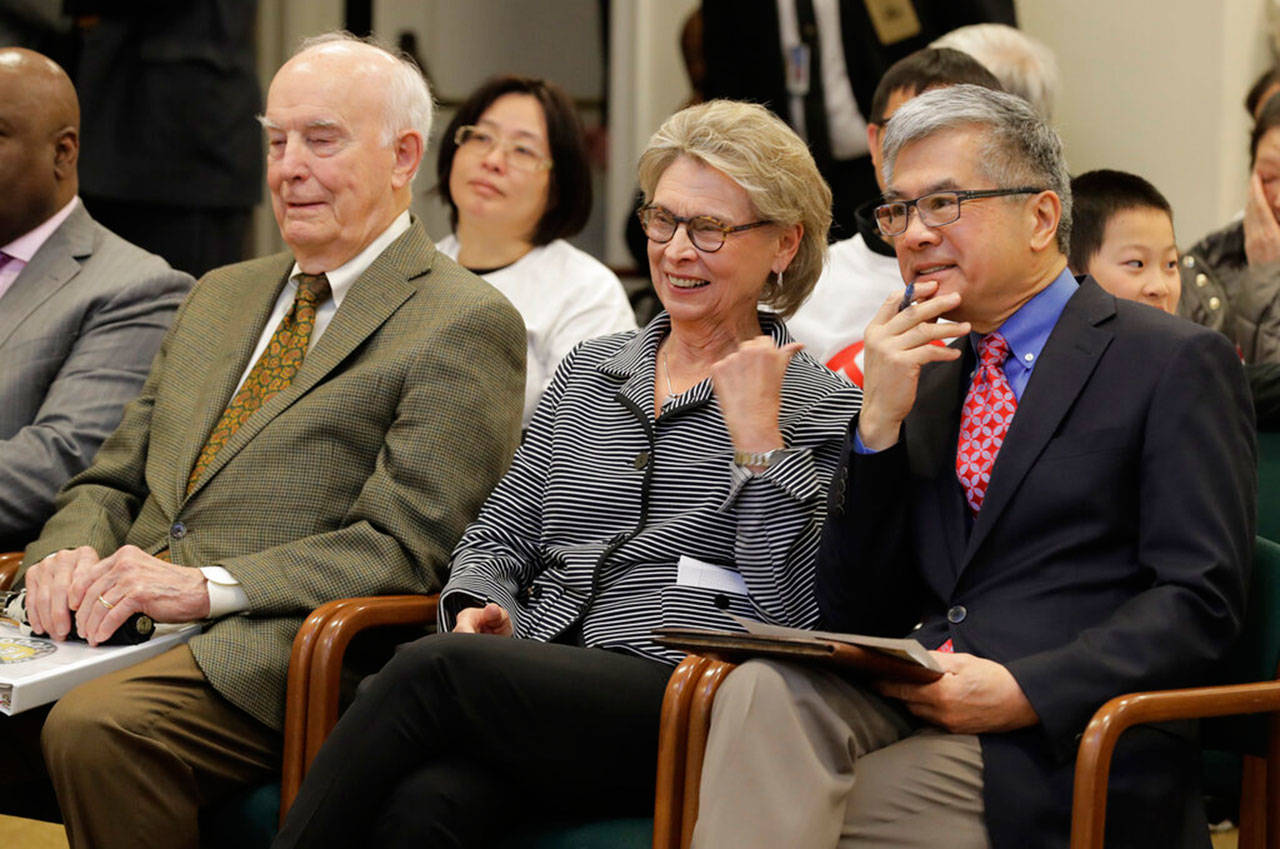By The Herald Editorial Board
Voters can be forgiven if they are still scratching their heads over why a measure on the general election ballot is referred to as both a referendum and an initiative — each with its own number — and its complicated path to the ballot, with separate and opposing signature drives.
In as few words as possible: Initiative 1000 started as a petition drive to rewrite an earlier initiative, I-200, that was passed by state voters in 1998 and restricted affirmative action practices regarding race, sex, ethnicity, color or national origin in college admissions and government hiring and contracts. Following a successful signature drive, the Legislature this spring adopted I-1000, electing not to send it to voters for their approval. A campaign opposed to the initiative launched its own petition drive to put the issue before voters, successfully qualifying Referendum 88 for the ballot.
Put simpler than that: Voters should approve R-88 if they want to uphold I-1000; or vote against R-88 if they want to repeal it.
As to whether I-200, the 20-year-old law, has unfairly and harmfully limited recruitment and outreach to minority communities and should be amended, the answer is yes; voters should uphold I-1000 by approving R-88.
On its surface, I-200 sounds reasonable and fair, prohibiting public intuitions from discriminating or granting preferential treatment based on race, ethnicity and similar factors. And I-1000 doesn’t fully repeal I-200; the new initiative keeps I-200’s prohibition against the use of quotas and preferential treatment in those decisions. What it does is free up colleges and state and local governments to do more recruitment and outreach to women and minorities to increase diversity.
But I-200’s supposedly colorblind approach has failed to deliver on its intentions of equity and fairness in matters of college admissions, hiring for public jobs and awarding government contracts.
A state analysis considered by state lawmakers showed, for example, that the percentage of state dollars that went to contracts with businesses owned by women or minorities dropped from 13 percent in 1998 to about 3 percent in 2017, according to a recent KUOW (94.5 FM) report.
Regarding college admissions, 2018 figures from the University of Washington’s campuses showed that while Hispanics make up about 13 percent of the state’s population, they account for only 8.2 percent of UW’s admissions; other inequalities, smaller but signifcant, were noted for those of two or more races and Native Americans.
Snohomish County Executive Dave Somers, during an interview with The Herald Editorial Board, said the county, in its hiring, has seen the same difficulty in reflecting the county’s diversity in its hiring.
“We need to be able to do targeted outreach and assistance to reduce those barriers and impediments,” Somers said. “We’re a really diverse county and our workforce needs to reflect that.”
Chris Reykdal, the state Superintendent of Public Instruction, speaking by phone at the meeting, pointed to the same disparity for school districts in their attempts to hire teachers who better reflect the students they serve. Teachers of color represent about 12.5 percent of all teachers in the state, Reykdal said, but are teaching in schools where students of color are the majority of a school district’s enrollment.
I-200, Reykdal said, has had a chilling effect on school district’s outreach and recruitment of teachers who would better reflect the students in schools and has crushed districts’ ability to achieve a diverse workforce.
“When we ask superintendents and principals about their efforts, they are very candid in saying, ‘You know, we have an eye out for diversity, but we get counsel on a regular basis that says be careful not to have goals and targets around equity because of I-200,’” the state schools chief said.
Opponents of I-1000, specifically John Carlson, the political strategist and Seattle radio talk show host, doubts the claims of supporters that I-1000 won’t result in quotas and preferential treatment for less qualified candidates. He notes that the ballot title itself qualifies their prohibition with the phrase, “as defined.”
“They define it by redefining the term,” Carlson said in a separate interview with the editorial board.
But supporters say I-1000 has been reviewed by legal experts and by the state Office of the Attorney General and would not permit the use of quotas or preferences. As well, a governor’s commission on diversity will monitor and enforce compliance.
I-1000’s principle also appears to have been affirmed earlier this month in federal court; a decision for Harvard University upheld the race-equity focus of its admissions policy.
Voters, in considering a yes vote for R-88, should also note that I-1000’s adoption would bring the state in line with the practice of 42 other states as well as that of private employers, who depend on recruitment efforts and outreach to minority candidates to build inclusive and diverse workforces.
I-200 has left students, prospective employees and companies at a disadvantage, limiting their opportunity to apply for admission to colleges, jobs and contracts. And it has put the state at a competitive disadvantage with the states and businesses that are already benefiting from those efforts.
I-1000 makes necessary changes to I-200, while honoring its call for fairness and equality. Voters should pass R-88 and its adoption of I-1000.
Talk to us
> Give us your news tips.
> Send us a letter to the editor.
> More Herald contact information.

























